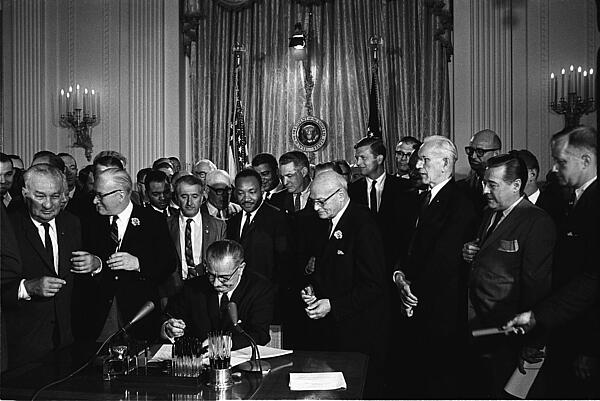1964 Civil Rights Act
The 1964 Civil Rights Act was a major piece of legislation aimed at ending racial segregation. Although John F Kennedy was the architect of the bill, it was eventually pushed through Congress by Lyndon Johnson. The 1964 Civil Rights Act prohibited employment discrimination and made segregation in public places illegal.

In 1963, J F Kennedy gave a passionate speech about the huge racial inequalities in America:
"This is one country. It has become one country because all of us and all the people who came here had an equal chance to develop their talents. We cannot say to 10 per cent of the population that you can't have that right; that your children cannot have the chance to develop whatever talents they have; that the only way that they are going to get their rights is to go in the street and demonstrate. I think we owe them and we owe ourselves a better country than that."
The evidence of this inequality was based on a report by the Civil Rights Commission (an organisation set up following the 1960 Civil Rights Act). The report revealed that life expectancy for African Americans was seven years less that White Americans; that property values dropped when a black family moved into a white neighbourhood, and the 57 per cent of African American housing was judged to be unacceptable.
During his short time in office, Kennedy was restricted by what he could do in regards to civil rights. He won the 1960 election by a small majority (500,000 votes), so he did not have the poplar support to support anything too drastic. Moreover, the Cuban Missile Crisis and the looming Vietnam War dominated his agenda.
The bill was still being debated in Congress when Kennedy was assassinated on 22 November 1963. Once Lyndon Johnson took office, the bill gained major momentum in Congress. Johnson’s commitment to the cause was made clear in his first State of the Union address:
“Let this session of Congress be known as the session which did more for civil rights than the last hundred sessions combined.”
Moreover, by 1964 the Civil Rights Movement had grown in strength. Figures such as Malcolm X and Martin Luther King gained more and more popularity. A Civil Rights Act was becoming increasingly necessary.
The civil rights bill survived, despite opposition from the South. This was partly due to the public support following Kennedy’s assassination. Even so, in Congress the bill faced many attempts to weaken it. Johnson appealed to the nation for support - he framed it as a patriotic and democratic act.
By January 1964, the civil rights act had the support of 68 per cent of the population. President Johnson signed the 1964 Civil Rights Act in July 1964.
The provisions of the Civil RIghts Act included the prohibition of racial discrimination and segregation in public places, including theatres and restaurants. The act also banned race, religious, national origin and gender discrimination by employers. An Equal Employment Employment Opportunity Commission was created to uphold this law.
Furthermore, the act forbade the use of federal funds for any discriminatory programme, authorised the Office of Education to assist with school desegregation and banned the unequal application of voting requirements.
The act was received with contempt by many Southerners. Ironically, much of the criticism for the act came from the African American community, which argued that it did not go far enough. The Mississippi Freedom Democratic Party believed that the politicians who dominated civil rights issues did not represent the majority of blacks. Thus, they demanded seats at the Democratic Party Convention.
However, the significance of the passage of the 1964 Civil Rights Act can not be underestimated. It paved the way for two more civil rights acts: the Voting Rights Act of 1965 and the Fair Housing Act of 1968. It has also been hailed as Johnson’s greatest achievement.
See also: The 1965 Voting Rights Act
MLA Citation/Reference
"1964 Civil Rights Act". HistoryLearning.com. 2026. Web.
